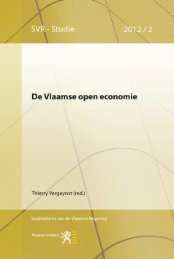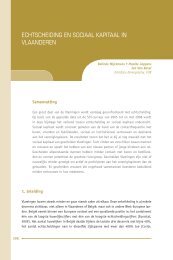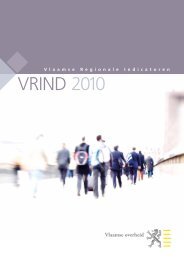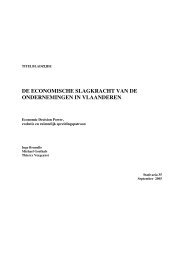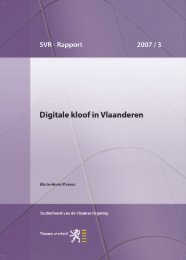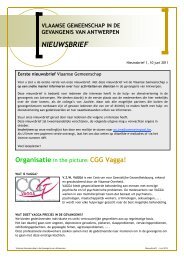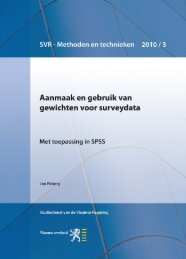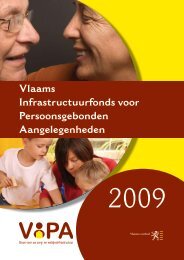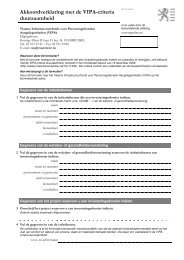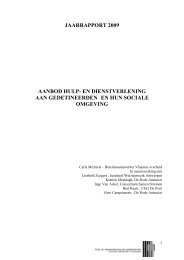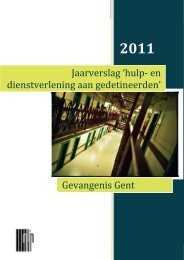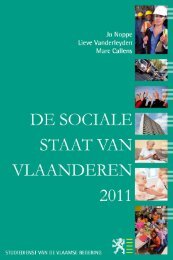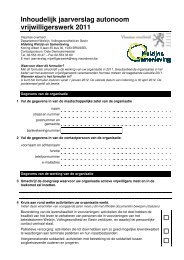schutbladen + eerste blad.indd - Vlaanderen.be
schutbladen + eerste blad.indd - Vlaanderen.be
schutbladen + eerste blad.indd - Vlaanderen.be
Create successful ePaper yourself
Turn your PDF publications into a flip-book with our unique Google optimized e-Paper software.
Moy, P., Scheufele, A.D. & Hol<strong>be</strong>rt, L.R. (1999). Television use and social capital: testing Putnam’s time displacement<br />
hypthesis. In: Mass communication and society, 2 (12), 27-46.<br />
Mutz, C.D., Ro<strong>be</strong>rts, F.D. & van Vuuren, D.P. (1993). Reconsidering the displacement hypothesis. Television’s<br />
influence on children’s time use. In: Communication Research, 20 (1): 51-75.<br />
Norris, P. (1996). Did television erode social capital A reply to Putnam. In: Political Science and Politics, 29,<br />
474-480.<br />
Norris, P. (2000). The impact of television on civic malaise. In: Pharr, S.J. & Putnam R.D. (eds.). Disaffected<br />
democracies: What’s troubling the trilateral countries. New Jersey: Princeton University Press, 231-251.<br />
Paxton, P. (1999). Is Social Capital declining in the United States A Multiple Indicator Assessment. In: American<br />
Journal of Sociology, 105 (1), 88-127.<br />
Putnam, D.R. (1993). Making democracy works. Civic traditions in modern Italy. New Jersey: Princeton University<br />
Press.<br />
Putnam, D.R. (2000). Bowling alone: the collapse and revival of American community. New York: Simon &<br />
Schuster.<br />
Putnam, R. (1995a). Bowling Alone: America’s Declining Social Capital. In: Journal of Democracy, 6 (1), 65-<br />
78.<br />
Putnam, R. (1995b). Tuning In, Tuning Out. The Strange Dissapearance of Social Capital in America. In:<br />
Political Science and Politics, 28 (4), 664-683.<br />
Redig, G. (2005). Deelnemen of deelheb<strong>be</strong>n. Een verkenning op weg naar een nieuwe regelgeving. Presentatie op<br />
het ISB-congres ‘De sportdienst: consulent voor de sportactoren, gangmaker van het lokale sport<strong>be</strong>leid’,<br />
Leuven, 16 en 17 maart 2005.<br />
Scheepers, P. & Janssen J. (2001). Informele aspecten van sociaal kapitaal. Ontwikkelingen in Nederland<br />
1970-1998. In: Mens & maatschappij, 76 (3), 183-201.<br />
Scheepers, P., & Janssen, J. (2003). Informal aspects of social capital: developments in the Netherlands. In:<br />
The Netherlands’ Journal of Social Sciences, 39 (2), 87-106.<br />
Shah, D.V., Kwak, N. & Hol<strong>be</strong>rt, R.L. (2001). “Connecting” and “disconnecting” with civic life: Patterns of<br />
Internet use and the production of social capital. In: Political Communication, 18, 141-162.<br />
Skocpol, T. (2003). Diminished Democracy. From mem<strong>be</strong>rship to management in American Civic Life. Norman:<br />
University of Oklahoma Press.<br />
Smits, W. (2000). Maatschappelijke participatie van vrouwen in <strong>Vlaanderen</strong>. In: Ethiek & Maatschappij, 3 (2),<br />
80-102.<br />
Smits, W. (2004). Maatschappelijke participatie van jongeren. Bewegen in de sociale, vrijetijds- en culturele ruimte.<br />
Eindverslag van het PBO-project (PBO99A/14/85). Brussel: TOR.<br />
Smits, W. (2007). Participatie: met mate(n) gemeten. Operationalisering van sociale participatie en vrijetijds<strong>be</strong>steding.<br />
Steunpunt Beleidsgericht Onderzoek, Cultuur, Jeugd en Sport & TOR.<br />
Smits, W. (2008). The social participation career: effects of early participation on participation and citizenship<br />
values in young adulthood. Paper gepresenteerd op ‘The Social Capital Foundation Conference’, Malta,<br />
19-22 septem<strong>be</strong>r 2008.<br />
Stevens, F. & Elchardus, M. (2001). De speelplaats als cultureel centrum. De <strong>be</strong>leving van de leefwereld van jongeren.<br />
Eindverslag voor het PBO-project (PBO 97/16/115). Brussel: TOR.<br />
Stolle, D. (1998). Making Associations Work. Group Characteristics, Mem<strong>be</strong>rship and Generalized Trust. Paper<br />
gepresenteerd op ‘The Annual Meeting of the American Political Science Association’, Boston (VS), 3-6<br />
septem<strong>be</strong>r 1998.<br />
Stolle, D. & Rochon R.T. (1998). Are all associations alike Mem<strong>be</strong>rship diversity, associational type, and the<br />
creation of social capital. In: American Behavioral Scientist, 42 (1): 47-65.<br />
SVR - Studiedienst van de Vlaamse Regering (2008). Het verenigingsleven in <strong>Vlaanderen</strong>, Een verkennende<br />
nota. Onuitgegeven nota, Brussel: Studiedienst van de Vlaamse Regering.<br />
Terhell, L. (2004). Veranderingen in het persoonlijke netwerk na echtscheiding. Amsterdam.<br />
Tönnies, F. (1935 [1887]). Gemeinschaft und Gesellschaft: Grund<strong>be</strong>griffen der reinen Soziologie, Darmstadt:<br />
Wissenschaftliche Buchgesellschaft.<br />
Van den Broek, A., De Haan, J. & de Hart, J. (2007). Sociale participatie. In: Sociaal en Cultureel Planbureau,<br />
De Sociale Staat van Nederland 2007. Den Haag: Sociaal en Cultureel Planbureau, 189-213.<br />
Vandeweyer, J. (2002). Sociaal gebab<strong>be</strong>l. Het verband tussen sociale interactie, de diversiteit van interactiepartners<br />
en democratische waardepatronen nader <strong>be</strong>keken. In: Elchardus, M. & Glorieux, I. (red.). De<br />
symbolische samenleving. Een exploratie van de nieuwe sociale en culturele ruimtes. Tielt: Lannoo, 151-174.<br />
Verba, S., Schlozman, K.L. & Brady, H.E. (1995). Voice and Equality: Civic Voluntarism in American Politics.<br />
Cambridge: Harvard University Press.<br />
Wellman, B., Haase, A.Q., Witte, J. & Hampton, K. (2001). Does the Internet increase, decrease or supplement<br />
social capital Social networks, participation and community commitment. In: American Behavioral<br />
Scientist, 45, 436-455.<br />
Wilson, J. & Musick, M.A. (1997). Work and Volunteering: The Long Arm of the Job. In: Social Forces, 76<br />
(1), 251-72.<br />
277 Al ge m e e n - So c i a l e p a rt i c i p a t i e



